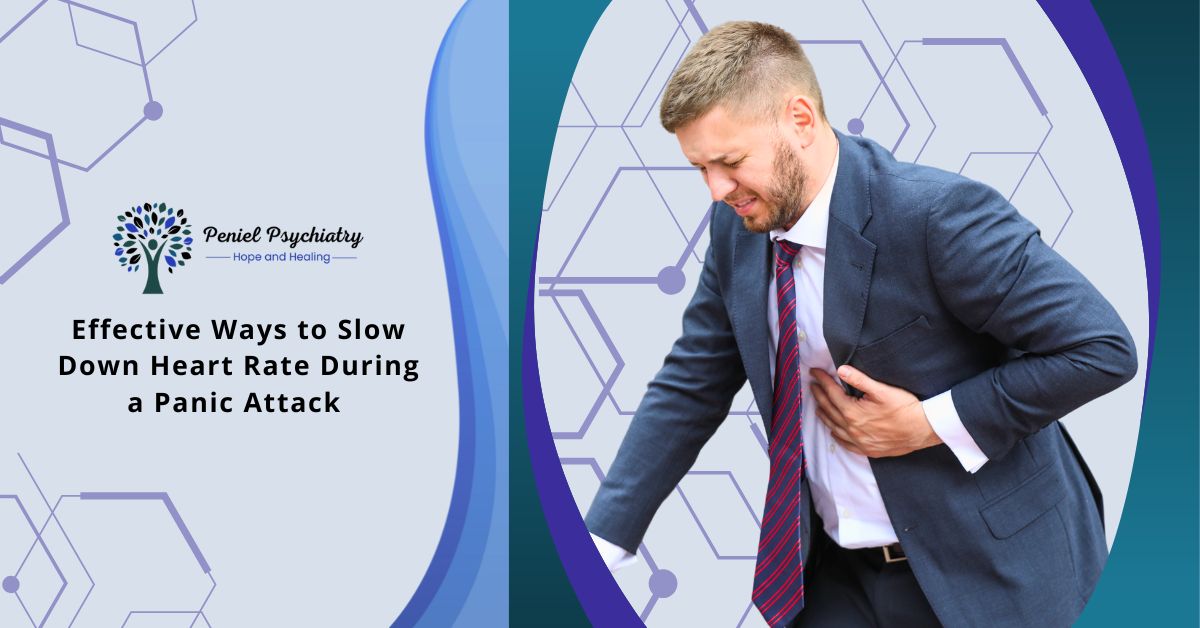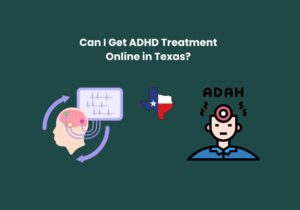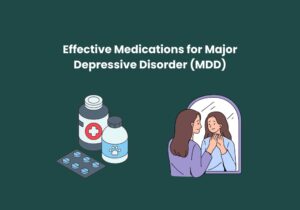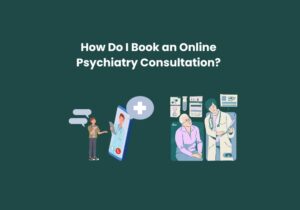You’re going about your typical day, and everything seems fine. And suddenly your heart rate increases. You feel a tightness in your chest. You can’t breathe properly. If this sounds familiar, you might be having a panic attack. It’s terrifying. It feels like your body is spinning out of control.
But don’t worry! You can lower your heart rate during this time. You can do some simple things to calm your heart and mind. Whether this is your first panic attack or you’ve had one before, these tips will help you take charge and feel better.
In this article, we’ll talk about how to lower your heart rate during a panic attack. We’ll also explore why your heart rate is high during this time and how you can better manage it in the future.
So, let’s get started! Let’s discuss how to take deep breaths and calm our bodies.
Understanding Panic Attacks and Their Physical Symptoms
Panic attacks are more than just feeling anxious; they come with real physical symptoms that can be frightening and confusing. Understanding how your body responds during one of these episodes is the first step toward regaining control.
Many people mistake these symptoms for a heart attack or another medical emergency, which only increases the fear. By learning about the physical reactions associated with panic, such as rapid heartbeat, shortness of breath, and dizziness, you can start to recognize the signs and respond appropriately. This knowledge empowers you to manage your anxiety before it spirals out of control.
What is a panic attack?
Shortness of breath can happen at any time. One minute you’re fine. Next, your heart starts racing and you can’t breathe. Panic attacks occur suddenly and can make you feel out of control. According to the National Institute of Mental Health (NIMH), shortness of breath is a brief burst of intense fear that hits you quickly. The feelings are real, and they can be terrifying.
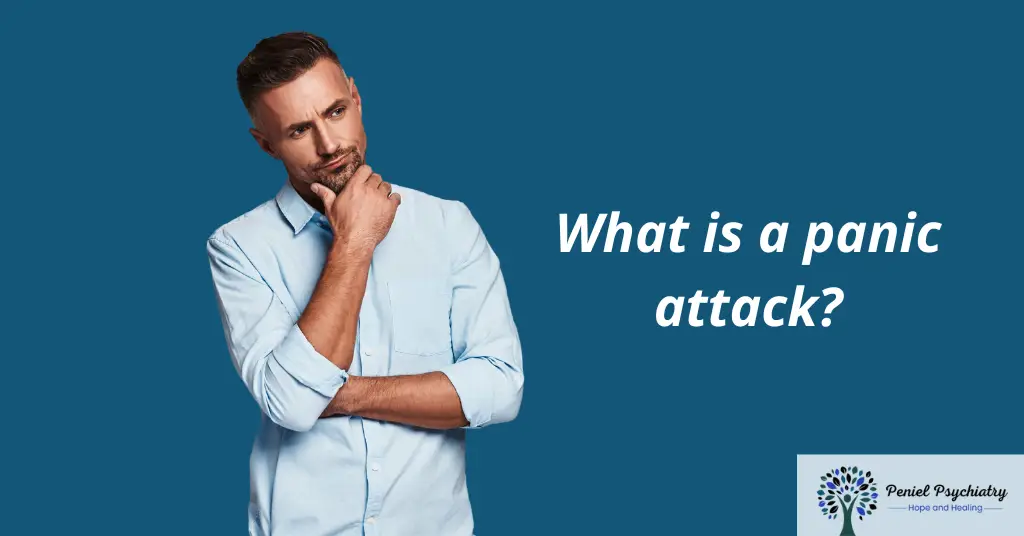
When you have a panic attack, your body reacts violently. Your heart starts beating faster. You may feel like you can’t catch your breath. You may sweat. You may even feel dizzy. These physical symptoms aren’t fun, but they’re part of how your body works during a panic attack.
It’s important to know that these feelings aren’t dangerous, even though they can feel overwhelming. And the good news is: There are things you can do to slow your heart rate and bring your body back to a calm state.
Why Does Your Heart Race During a Panic Attack?
Have you ever wondered why your heart races during a panic attack? It’s all about how your body reacts to stress. Your body has what’s called a fight-or-flight response. This is the system your body uses to help you deal with danger. Your body gets ready to fight or run when you’re in danger. It speeds up your heart rate and gets your body ready for action.
When you have a panic attack, your body goes into fight-or-flight mode even though there’s no real danger. Your heart beats faster because your body thinks it needs to act fast. The good news is, once you understand why your heart speeds up, you can help slow it down.
Why Does Your Heart Rate Increase During a Panic Attack?
Let’s take a deeper look at why your heart rate increases when you have a panic attack. It’s all about stress and anxiety.
- Adrenaline Rush: When you feel stressed or anxious, your body releases a hormone called adrenaline. This hormone gets your body ready for action. It makes your heart beat faster, breathing quicker, and muscles tense.
- Fight or Flight: As mentioned earlier, your body reacts as if in danger. It gets ready to fight the threat or run from it. This response is helpful when there’s danger, but it’s unnecessary and unhelpful during a panic attack.
- Stress Makes It Worse: When your mind gets caught up in worry or fear, it causes your body to react. The more you focus on the panic, the more your heart races. It’s a cycle that feeds on itself. But you can break that cycle with the proper steps.
It’s good to remember that your heart racing is just your body reacting. It’s not a sign that something is wrong with your heart. It’s just a reaction to stress and anxiety.
Practical Ways to Slow Down Your Heart Rate During a Panic Attack
Now that we know why our heart rate increases, let’s talk about the best ways to slow it down when you’re having a panic attack. Here are some simple techniques that can help.
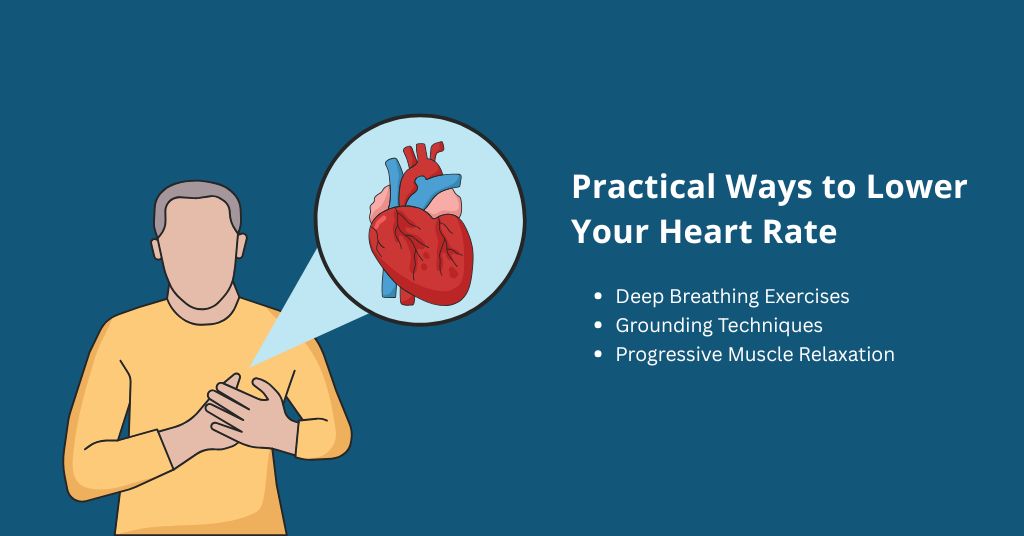
1. Deep Breathing Exercises
Breathing is one of the fastest ways to slow your heart rate. Deep breathing helps calm your nervous system and tells your body everything is okay.
Here’s a simple method: Try box breathing. Breathe in for 4 seconds, hold for 4 seconds, breathe out for 4 seconds, and hold for another 4 seconds. This technique helps you take control of your breath and your heart rate.
2. Grounding Techniques
Grounding can help you take your focus off the panic and back to the present. This can stop your mind from spiraling. One effective method is the 5-4-3-2-1 grounding technique. Here’s how it works:
- 5 things you can see
- 4 things you can touch
- 3 things you can hear
- 2 things you can smell
- 1 thing you can taste
Focusing on these things can distract your mind from the panic and help slow your heart rate.
3. Progressive Muscle Relaxation
This technique involves tensing and relaxing each muscle group, starting from your toes and moving to your head. It helps release physical tension and calm your heart rate. This is especially helpful when you feel your muscles tightening in response to anxiety.
Lifestyle changes can help prevent panic attacks.
While it is possible to control panic attacks, prevention is better. Some lifestyle changes can help you avoid them. These changes won’t work overnight, but can make a big difference over time. Let’s examine what you can do to reduce your chances.
1. Exercise Regularly
Exercise is a great way to calm your mind and body. When you exercise, your body releases endorphins, natural stress relievers. These endorphins make you feel happy and lower anxiety. Regular exercise, like walking, jogging, or yoga, helps your heart stay steady and your mind calm.
- Tips: Try to exercise for 30 minutes 3-4 times a week. Find an activity you enjoy, such as walking in the park or dancing. It doesn’t have to be intense. The key is consistency!
2. Manage stress
Stress is a significant cause of panic attacks. If you are constantly under stress, your body will react. Learning to manage stress can reduce this problem. You can reduce stress by meditating, practicing relaxation, or spending time in nature.
- Tips: Try mindfulness meditation for 10 minutes every day. This can help you stay calm and focused. Breathing exercises also work well when you are feeling anxious.
3. Eat a Healthy Diet
What you eat has a significant effect on how you feel. Eating a lot of processed foods, sugar, and caffeine can increase anxiety. On the other hand, a healthy diet with fruits, vegetables, and whole grains helps your body feel balanced.
- Tips: Cut back on caffeine and sugar, as they can make your heart race and increase anxiety. Instead, eat foods rich in magnesium and B vitamins like leafy greens, nuts, and seeds. These help keep your nervous system calm.
4. Get enough sleep
Sleep is essential for how we feel. If you don’t get enough sleep, your body will become more sensitive to stress, which can increase the likelihood of panic attacks. Lack of sleep can slow down your heart rate.
- Tips: Try to get 7-9 hours of sleep every night. Create a sleep schedule to relax your mind. Avoid using screens or eating large meals before bed to improve sleep.
By making these changes, you can lower your anxiety and reduce the chances of panic attacks. It may take time, so be patient with yourself. The key is to keep going.
When to Seek Professional Help
Sometimes, even with all the proper techniques, panic attacks still happen. If that’s the case, it might be time to get help from a professional. There’s nothing wrong with asking for help. It can be the key to managing your panic attacks and feeling better.
When should you seek professional help?
If your panic attacks are frequent, it’s a good idea to talk to your doctor. This problem can get in the way of your daily life. It’s not something you have to deal with alone. Here are some signs that it’s time to seek professional help:
- Frequent panic attacks: If you have this problem frequently, it may be time to see a professional. They can help you understand why it’s happening and how to fix it.
- It’s Affecting Your Life: If panic attacks stop you from going to work, school, or hanging out with friends, that’s a sign it’s time to ask for help. You deserve to live freely, without the fear of panic.
- Hard to Cope: If you find it difficult to cope with the stress or emotions that come with panic attacks, a professional can help. Therapists can teach you tools to deal with your anxiety.
What Can a Professional Do for You?
A doctor, therapist, or counselor can help you figure out why you’re having panic attacks. They will also show you ways to manage them. Here are some options:
- Cognitive Behavioral Therapy (CBT): Helps you change negative thoughts and behaviors. CBT teaches you how to manage anxiety and panic attacks. It can break the cycle of fear that causes the attacks.
- Medication: In some cases, doctors may recommend medications to reduce anxiety or stop panic attacks. These might include antidepressants or anti-anxiety medications. Always talk to a healthcare provider about which option is best for you.
- Relaxation Techniques: Therapists can also teach you relaxation methods to help calm your mind. These techniques will help you manage stress and avoid panic attacks in the future.
When Should You Seek Emergency Help?
Sometimes, panic attacks can feel like a serious health problem. If you experience any of the following symptoms, get help right away:
- Chest pain or tightness
- Severe difficulty breathing
- Dizziness or fainting
- Nausea or vomiting
These could be signs of something more serious, like a heart problem. If you feel these symptoms, it is essential to seek emergency medical help.
Do you need support from a therapist or counselor? Please don’t wait, book emergency assistance now and consult with our experienced professionals. Your well-being is our priority.
Frequently Asked Questions (FAQ)
Can Panic Attacks Cause Long-Term Damage to the Heart?
No, panic attacks do not cause long-term harm to your heart. During a panic attack, your heart rate speeds up because of stress. Your heart rate should return to normal once the attack is over. Seeing your doctor is always good if you’re worried about your heart health.
How Long Does It Take for the Heart Rate to Slow Down During a Panic Attack?
The time it takes to slow your heart rate can differ for everyone. If you use deep breathing or another calming technique, it may take just a few minutes. However, depending on the strength of your panic attack, it can take longer. The more you practice these techniques, the quicker it will be.
What If the Techniques Don’t Work?
If the techniques don’t work, don’t worry. It might take some time for your body to adjust. Try different methods and see which ones work best for you. If panic attacks happen often, talking to a professional is a good step. They can guide you on the best ways to handle panic attacks.
Are There Natural Remedies or Supplements That Can Help Reduce Heart Rate?
Some people find that chamomile tea or lavender oil helps calm them down. Magnesium is also great for reducing stress and supporting the heart. But before trying any new supplements or remedies, talk to a qualified health professional to ensure they are safe for you.
Can Exercise Help Prevent Panic Attacks?
Regular exercise is one of the best ways to reduce panic attacks. It helps lower stress and anxiety and keeps your heart strong, making it easier to handle panic. Try exercising for 30 minutes a few times weekly to feel the benefits.
Should I Avoid Caffeine If I’m Prone to Panic Attacks?
Yes, it’s a good idea to cut back on caffeine if you get panic attacks. Caffeine can make your heart race and cause more anxiety. Instead, try drinking herbal teas or decaf coffee to help keep your heart rate steady.
Conclusion
Panic attacks can be brutal, but you don’t have to face them alone. Understanding why your heart races and learning how to slow it down can help. You can use many tools, like deep breathing exercises, to make a big difference.
It’s essential to practice these techniques often. The more you practice, the faster you’ll be able to calm your heart rate and handle your anxiety. If panic attacks continue or get worse, reach out for professional help. Doctors and therapists can help you find the best way forward.
You don’t have to live with panic attacks forever. With time, patience, and strategies, you can take control and feel more peaceful and confident.

